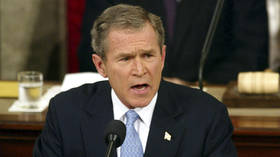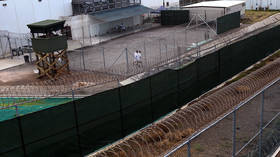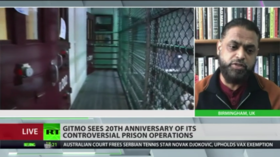20 years ago, the US coined the phrase ‘axis of evil’. Guess who’s been the most evil since?
Robert Bridge

Judging by the way past US leaders have described their rivals, you’d think Washington has been fighting against the likes of Darth Vader. On March 8, 1983, then-President Ronald Reagan branded the Soviet Union, America’s Cold War adversary, as an “evil empire” that was the “focus of evil in the modern world.” Fast forward nearly two decades later to January 29, 2002 and George W. Bush echoed Reagan’s fiery sermon in his State of the Union message when he described North Korea, Iran, and Iraq as rogue states belonging to an “axis of evil.” These were no accidental slips of the tongue.
The use of the good-bad dichotomy by Reagan and Bush worked as a simple yet highly effective propaganda tool since nobody wants to be seen defending ‘evil’, a word with strong biblical connotations practically synonymous with the devil himself. Thus, Republicans and Democrats were unanimous in their belief that these ‘evil regimes’ were worthy of annihilation, and who better to wage such a battle than the ‘exceptional’ nation? (Incidentally, just four months before Bush mentioned the ‘axis of evil’, the self-proclaimed ‘war president’ spoke about a “crusade on terrorism.” Predictably, that poor choice of words set off alarm bells across Europe, which is no stranger to wars of religion).
But was the Bush administration merely projecting its own ‘evilness’ onto other governments? Just days before Bush delivered his infamous ‘axis of evil’ speech, the US opened the doors to hell on earth known as Guantanamo Bay Detention Camp (Gitmo), or, as Amnesty International dubbed it, “the Gulag of our time.” Built on the southernmost tip of Cuba at the US Guantanamo Naval Base, a slither of land the US gained following the Spanish-America War (1898), Gitmo has become synonymous with brutality, torture, and the perversion of justice. In a word, ‘evil’.
Former Gitmo detainees in Bush’s ‘war on terror’ – many of whom were denied a trial or even legal counsel – have described horrific scenes of inhumane treatment, including sexual degradation, forced drugging, and religious persecution.
Moazzam Begg, a prisoner-turned-activist who spent three years at Gitmo, described the scenes of horror he witnessed. “I saw two people beaten to death,” Begg revealed to RT. “I saw one prisoner with his hands tied above his head to the top of the cage being repeatedly punched and kicked until he was killed. The Americans have accepted that this was a homicide.”
Personally speaking, the moment when I sensed something had snapped inside the American mind came after photographs emerged of detainees inside Camp X-Ray at Gitmo. The images left an impression that is hard to shake: a group of detainees kneeling inside a barbed-wire enclosure and wearing the standard orange jumpsuits, are seen handcuffed and outfitted in the latest ‘sensory deprivation’ gear – earmuffs, darkened goggles, face masks, even heavy mittens – with US soldiers hovering immediately behind them. Was the US military afraid that one of their prized prisoners – many of whom were never found guilty in court – might escape their island paradise and swim to freedom in shark-infested waters?
If not, then what was hoped to be gained from such cruel behavior, visible for the entire world to see, aside from the further radicalization of the enemy? At this point, the US looked every bit as sadistic, barbaric and, yes, ‘evil’, as the people who attacked us on 9/11.
But Uncle Sam was just warming up. Following 9/11, the Bush neocons would go hunting for those responsible for that outrage, right? Well, yes and no. Although Washington opened up a military offensive against the Taliban in Afghanistan for harboring Al Qaeda mastermind Osama Bin Laden, it quickly lost the support of the global community when it inexplicably turned its gun sights on Iraq, which had nothing to do with 9/11.
Here, the US must share some of its ‘evil’ accolades with its foremost ally, the United Kingdom. In September 2002, the then-UK prime minister, Tony Blair, in an effort to build the case for a military invasion of Iraq, cited an intelligence dossier that said Saddam Hussein could launch chemical weapons at the UK in just 45 minutes, a remark that the British tabloids happily devoured. (Not until 2016 with the publication of the Chilcot Report was it revealed what many had suspected all along: Saddam Hussein “posed no imminent threat” to the UK).
Iraq’s fate was finally sealed in February 2003 when then-US secretary of state, Colin Powell, appeared before the UN Security Council to bolster the case for war, reciting another litany of lies, otherwise known as “intelligence failures.” For theatrical effect, he even produced a vial of fake anthrax, warning that “Hussein has not ... accounted for even one teaspoon-full of this deadly material.” At this point, not even UN weapons inspectors on the ground in Iraq, unable to find any trace of weapons of mass destruction, could call off the dogs of war. The near nine-year conflict that ensued represented one of the worst humanitarian disasters of modern times as millions of Iraqis were either killed or displaced, while few saw a conflict of interest when former Vice President Dick Cheney’s old company, Halliburton, won a no-bid, $1.4 billion contract to rebuild Iraq's wrecked oil industry. Shall we call that ‘evil’ or just business as usual in the home of the brave?
Unfortunately, there is a dark footnote to the Iraq War that cannot be ignored considering the subject at hand. In April 2004, human rights violations against detainees at the hands of the US military were revealed to have occurred once again, this time at the Abu Ghraib prison in Iraq. The abuses, euphemistically described as ‘enhanced interrogation techniques’, included torture, rape and sodomy. The Economist, summing up this little shop of horrors, carried a front-page photo that showed a hooded detainee with arms outstretched standing on a box and attached to electrodes, with the words “Resign, Rumsfeld,” in reference to the then-secretary of defense, Donald Rumsfeld.
In 2008, after eight long years of neoconservative planet smashing, battle-weary Americans were ready for some hope and change, electing the Democrat, Barack Obama, to the White House. The entire world let out a collective sigh of relief, confident that America’s first black president –greeted almost universally as a savior – would usher in an era of peace, tranquillity, and sanity. The world would awaken from its fever dream sooner than it could have imagined. In March 2011, the global fireworks started once again as the US and Western allies began a massive aerial bombardment of Libya, which had been struggling through a civil war.
Soon it because obvious that the excuse of “protecting civilians” was a thinly veiled pretense to bring down the government of Muammar Gaddafi. And although Gaddafi certainly had his character flaws, as do most leaders, he had turned Libya into the wealthiest country in Africa. The wealth, however, was not hoarded by a small cabal, but shared among the people in the form of free medical care and education.
When the then-secretary of state, Hillary Clinton, learned of the death of Gaddafi, who was brutally killed by a street mob, she proclaimed with a giddy cackle, “We came, we saw, he died.”
As for Barack Obama, who was awarded the Nobel Peace Prize after just nine months in office, Libya actually registered as a small blip on his radar screen. In 2016 alone, US forces dropped at least 26,171 bombs on foreign countries. Syria and Iraq were both targeted some 12,000 times each, while Afghanistan (1,337), Libya (496), Yemen (35), Somalia (14), and Pakistan (3) also experienced attacks on their territory. Obama – the ‘peace president’ – left office in 2016 with the dubious distinction of being at war longer than any other US president in history.
One of the unfortunate legacies of the Bush and Obama administrations – which delivered the world 16 years of warmongering – was the expansion of executive powers to start military conflicts without congressional approval. It also empowered US presidents to order drone strikes on American citizens abroad without due process thanks to the Authorization to Use Military Force (AUMF) law. At the same time, the government may gather millions of Americans’ emails and phone records – as Edward Snowden, the former National Security Agency employee turned whistleblower, revealed in 2013 – with minimal judicial oversight.
That brings us to Donald Trump, the maverick political outsider who pledged to “drain the swamp” and put the brakes on America’s overseas military adventures. While the 45th POTUS has the rare distinction of keeping the US out of a full-blown hot war for the duration of his one term in office, this achievement is clouded by the realities on the ground.
Under the populist Republican leader, bombings against Afghanistan hit an unprecedented level compared to prior years. In the first nine months of 2018, the UN Assistance Mission in Afghanistan (UNAMA) documented 8,050 civilian casualties (2,798 deaths and 5,252 injured), which was a similar number to the same period in 2017. This was the most civilian deaths during the same nine- month period since 2014.
Meanwhile, two years ago this month, Trump ordered the assassination of Iran’s top general Qassem Soleimani, the leader of the Islamic Revolutionary Guards Corps (IRGC) Quds Force. Soleimani, who Tehran says had been on a diplomatic mission in Baghdad by invitation of the Iraqi government, was killed by a US drone strike near the city’s airport. What is so remarkable about Washington’s decision to take out Soleimani is that this gifted commander played a large role in eliminating the Islamic State network across the Middle East; in other words, he was practically an ally of the US in the fight against terrorism. What has the US gained from his death? Like so many other US moves on the geopolitical stage in the past, the reasoning behind this is hard to decipher.
The preceding has been a summary, and a very limited one, of the menacing – some might say ‘evil’ – behavior of the US over the course of several presidential administrations. The purpose of such an outline is not necessarily to demonstrate that the US is perhaps more rapacious than other governments, but rather that it has very little room for branding other nations as inherently ‘evil’. In fact, the overt acts of ‘evil’ carried out by Iraq, Iran, and North Korea, which could warrant some sort of aggressive response from the US, are simply non-existent.
Although it could be argued that these three countries have particular national traditions that might be labeled ‘oppressive’ from the Western perspective, it would certainly take little effort from the citizens of Iraq, Iran, and North Korea to cite problems with the US that they also find worthy of contempt. However, to allow the rhetoric to go so far as to say that an entire people are inherently ‘evil’ is simply irresponsible and reckless. These countries are no more inherently ‘good’ or ‘evil’ than the US is; nations can be expected to behave either ‘right’ or ‘wrong’ as the circumstances dictate.
With that said, in the current frame of reference, there can be no doubt that the ‘bad behavior’ committed by the world’s military superpower, the United States of America, has far exceeded that of the so-called ‘axis’ of Iraq, Iran, and North Korea. Yet there remains a question worth asking: would the behavior of those three axis countries have been more in line with that of Washington’s had they enjoyed more military strength on the geopolitical stage? That’s perhaps best left for the political philosophers to answer. But Lord Acton probably summed it up best with his well-known maxim, “Power corrupts; absolute power corrupts absolutely.” In other words, ‘absolute power’ is the real ‘evil’ that we should be most concerned about.
The statements, views and opinions expressed in this column are solely those of the author and do not necessarily represent those of RT.
https://www.rt.com/op-ed/547642-us-bush-axis-evil/



0 Comments:
Post a Comment
Subscribe to Post Comments [Atom]
<< Home